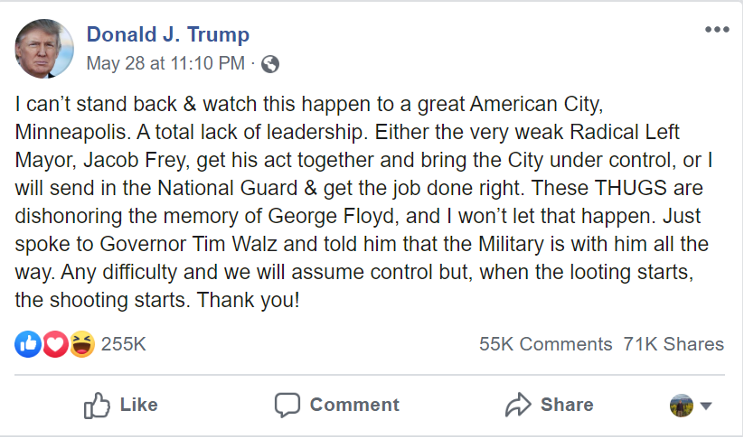At a time when conservatives have been complaining about unfair treatment at the hands of social media companies, a group of Facebook employees feel their company hasn’t gone far enough, especially where President Trump’s posts are concerned. On Monday they staged a “virtual walkout” by taking the day off. Since most of Facebook’s employees are already working from home, they didn’t have to go far.
According to The New York Times, the disgruntled Facebook employees are upset with the president’s posts concerning the rioting around the country in the aftermath of the death of George Floyd, and in particular, this post which they deem racist:
The president later posted that he was talking about the fact that with looting and riots, shootings follow; he wasn’t advocating for lethal force to be used by authorities.
Facebook’s official response to the walkout was simply to let it happen; it didn’t punish anyone.
Mark Zuckerberg, the founder and CEO of Facebook, has publicly taken the position that the popular social media platform should not be censoring free speech. His position differs from his counterparts at Twitter who recently appended “fact-check” notes to a couple of the president’s tweets.
Zuckerberg personally responded to the president’s post with one of his own last Friday, which said, “Personally, I have a visceral negative reaction to this kind of divisive and inflammatory rhetoric. But I’m responsible for reacting not just in my personal capacity but as the leader of an institution committed to free expression.”
Ironically, President Trump signed an executive order late last week – partly in response to Twitter’s “fact checks” of his posts – asking federal agencies to look into revising the regulations concerning the shield from liability that digital media platforms typically enjoy under Section 230 of the Communications Decency Act of 1996. That law, which was designed to protect companies that passively host digital content on their platforms, was passed long before the rise of social media. Now that companies like Twitter, YouTube and Facebook act as censors to edit or prohibit content they don’t like, or editorialize in line with their own ideology and worldview, it may be time to re-think the breadth of Section 230. With editorial freedom ought to come responsibilities that other media companies face, such as liability for defamation, as an example.
Zuckerberg is wise to see the value in the free exchange of ideas, even if some of his own employees don’t. It remains to be seen, though, whether he can keep the youthful ideologues at Facebook reined in sufficiently to keep the social media giant relatively free from further government oversight and regulation.
Photo from Thaspol Sangsee / Shutterstock.com







